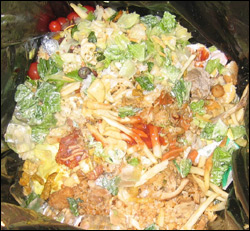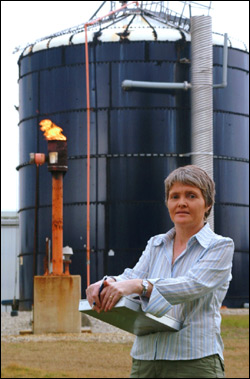Biomass
UF has extensive experience in biomass energy technologies and has established centers and laboratories to strengthen the research. These include:
The Bioprocess Engineering Research Laboratory (BERL) has a sustained research program on biogasification of biomass. Technologies such as SOLCON and SEBAC processes were developed by BERL. The group has worked with NASA’s Environmental Systems Commercial Space Technology Center (ESCSTC) based at UF to further develop and adapt a biogasification system for space applications. Recently ESCSTC and BERL have secured a $1M research grant from Xcel Energy to develop, design and construct a 2 ton/day pilot plant for biogasification of sugar beet tailing residues generated at American Crystal Sugar factories. Other Research areas include:
- Development of
a process for biodiesel manufacture with integrated utilization of byproducts.
- Development of
thermochemical biomass gasification and pyrolysis processes.
- Development
of process for biohydrogen production from biomass.
- Gasification of biomass, waste and/or coal for clean energy production
|
|
|
Biogassification |
 |
|
Anaerobic digestion of organic waste produces biogas, a methane-rich fuel that can be used for heating, electricity generation, and as a substitute for natural gas. |
 |
|
Dr. Ann Wilkie stands in front of the UF-IFAS Fixed-Film Anaerobic Digester. |
The Bioenergy and Sustainable Technology Laboratory (BEST) conducts basic and applied research on environmental biotechnology, with particular emphasis on anaerobic microbiology and the practical application of anaerobic digestion technology for renewable energy production from biomass and organic residues. Anaerobic digestion is a process by which a complex mixture of symbiotic microorganisms transforms organic materials under oxygen-free conditions into biogas, a mixture of mostly methane and carbon dioxide. Using anaerobic digestion, biogas can be produced from a broad range of feedstocks, including readily available animal manures, crop residues, and industrial and municipal wastes. Also, energy crops can be grown for use directly as a biogas feedstock. Research at BEST includes:
- Anaerobic digester design and development.
- Livestock waste management technology for biogas production, odor
control, nutrient recovery and water quality improvement.
- Biogas production from organic substrates, including food waste,
fruit and vegetable processing waste, aquatic biomass, municipal
wastewater, etc.
- Biogas production from biofuel (e.g. bioethanol, biodiesel)
by-products, including stillage, vinasse, and crude glycerol.
- Biogas production from energy crops.
- Algal bioprospecting for biodiesel production.
- Sustainability, climate change, and greenhouse gas reduction.
BEST resources include an Anaerobic Digestion Research and Demonstration Facility with an on-site laboratory for microbial and environmental analyses, a pilot plant consisting of four 90-gallon digester units for research and development, and a prototype (100,000 gal.) fixed-film digester that produces biogas from flushed dairy manure. The research performed at BEST has resulted in U.S. and international patents.
 |
|
Bagasse - Biomass Residues |
|
|
|
Sugarcane Plantation |
The
Florida Center for Renewable
Chemicals and Fuels was established in January 2002 with
the primary goal of facilitating research and graduate education
throughout the State University System in the multi-disciplinary
areas of renewable chemicals and fuels that use products from
agriculture as feedstocks to replace petroleum-based products.
The research performed at the center has already resulted in patents,
licenses and sublicenses to small and large corporations which
are actively engaged in commercialization activities in the U.S.,
Europe, and Asia.
Research projects coordinated by the Center focus on four major
areas:
- Microbial
Metabolic Engineering - development of biocatalysts for the
production of fuel ethanol and other chemicals from renewable
plant biomass
- Depolymerization
of Cellulose and Hemicellulose - development of microbial
enzymes systems to solubilize cellulose and hemicellulose
in the cell wall of plants into sugars that can serve as inexpensive
renewable source for conversion into fuels and chemicals.
- Microbial
and Plant Sensors - development of microorganisms and plants
that can be used as bio-indicators of hazardous materials
such as explosives and other chemicals
- Environmental Microbiology - development of processes and organisms to remove biological and chemical hazards in contaminated soil and water.
A Research/Demonstration plant to provide a platform for research and improvements and for design engineering to construct full scale plants of 20-50 million gallons of ethanol per year has been planned. Energy crops, agricultural residues and forestry residues, and municipal green waste could support over 200 such plants in Florida, creating employment, improving the environment, and ensuring that Florida is doing its part to promote energy independence.



